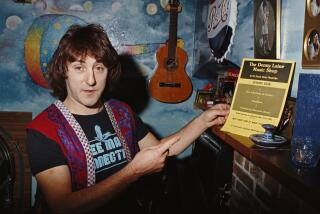JAZZ REVIEWS : FULL MARKS FOR LAINE, DANKWORTH
- Share via
It takes a certain sense of security for a singer to begin her set with a ballad and end with another ballad. Cleo Laine is by all means secure enough.
It takes an exceptionally talented couple to perform a work as subtle as “Thee I Love,” or to compose a song as sensitive as “Charms.” Cleo Laine, the lyricist, and John Dankworth, her melodist mate, are that couple.
It takes an assumption of literacy on the part of one’s audience to include a set of poems by Shakespeare, W. H. Auden and others set to music. At Royce Hall on Friday evening, the Dankworths again proved that they can attract such listeners.
Laine and Dankworth are articulate and humorous in ways that are as essentially British as their accents. None of this would matter, of course, if Lane were not possessed of vocal powers that seem to keep growing as the years (and her octaves) add up. The song she calls “Taking a Chahnce on Love” went through five keys, moving upward every time in a typical tour de force. She tosses off those unthinkably high notes as casually as if she were brushing lint off her gown.
Some of the repertoire Friday was long familiar: Spike Milligan’s poem about British teeth (“Three Cheers for the Brown, Gray and Black”), some of the blithe unison scatting with Dankworth’s saxophone (“Turkish Delight”). Others were relatively new, such as three songs from her 1986 Broadway musical hit, “Edwin Drood,” and selections from the album that won her a Grammy award last year.
As she pointed out, 1986 was a singularly rewarding year for her. Dankworth said: “It wasn’t too good a year for me. However, I did win the SANDY award--the Saxophone Assn. of North Dakota Yachtsmen.”
Dankworth’s role as arranger for Laine cannot be underestimated. Both he and Ray Loeckle doubled on various reed instruments and keyboards. Guitarist Larry Koonse contributed several attractive solos, with Jon Ward on bass and Jim Zimmerman on drums completing the group.
Both halves began with the Dankworth quintet, most notably in his own original, “Princess,” and more forgettably in a reworking of Paganini’s 24th Caprice that smacked a little of early Benny Goodman-Gene Krupa histrionics.
The Dankworths exude class, tempered with enough relaxation and humor to rein in an occasional tendency to theatricality. A standing ovation accorded them by the near-capacity house was precisely what these two brilliant Britons deserved.
More to Read
The biggest entertainment stories
Get our big stories about Hollywood, film, television, music, arts, culture and more right in your inbox as soon as they publish.
You may occasionally receive promotional content from the Los Angeles Times.










